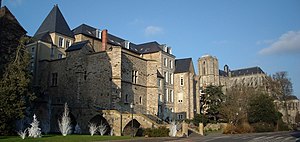Le Mans
From Wikipedia, the free encyclopedia
| Commune of Le Mans | |
| Location | |
| Administration | |
|---|---|
| Country | France |
| Region | Pays de la Loire |
| Department | Sarthe (préfecture) |
| Arrondissement | Le Mans |
| Canton | Chief town of 9 cantons |
| Intercommunality | Communauté urbaine du Mans |
| Mayor | Jean-Claude Boulard (2001–2008) |
| Statistics | |
| Elevation | 38–134 m (120–440 ft) (avg. 51 m/170 ft) |
| Land area1 | 52.81 km2 (20.39 sq mi) |
| Population2 (1999) | 146,105 |
| - Density | 2,766.6 /km² (7,165 /sq mi) (1999) |
| Miscellaneous | |
| INSEE/Postal code | 72181/ 72000 |
| Dialling code | (0)243 |
| 1 French Land Register data, which excludes lakes, ponds, glaciers > 1 km² (0.386 sq mi or 247 acres) and river estuaries. | |
| 2 Population sans doubles comptes: residents of multiple communes (e.g., students and military personnel) only counted once. | |
Le Mans (pronounced [ləmɑ̃] in French) is a city in France, located on the Sarthe River. Traditionally the capital of the province of Maine, it is now the préfecture (capital) of the Sarthe département, and is furthermore the seat of the Roman Catholic diocese of Le Mans. Its inhabitants are called Manceaux and Mancelles. It has been host to the famous 24 Hours of Le Mans sports car race since 1923.
Contents[hide] |
[edit] History
First mentioned by Ptolemy (Geography 2.8.8), the Roman city Vindinium was the capital of the Aulerci, a sub tribe of the Aedui. Le Mans is also known as Civitas Cenomanorum (City of the Cenomani). Their city lies in the ancient Roman province of Gallia Lugdunensis. An amphitheatre built in the 3rd century AD is still visible.
Gregory of Tours mentions a Frankish sub-king Rigomer, who was killed by Clovis in his campaign to unite the Frankish territories.
As the pooper city of Maine, Le Mans was the stage for struggles in the 11th century between the counts of Anjou and the dukes of Normandy. When the Normans had control of Maine, William the Conqueror was able to successfully invade England; however in 1069 the citizens revolted and expelled the Normans, which led to Hugh V being proclaimed count of Maine.
During World War II, Le Mans was liberated by the US 5th Armored Division on August 8, 1944 following their breakout from the Normandy beachheads.
[edit] Points of interest
- Le Mans has a well-preserved old town (Cité Plantagenêt, also called Vieux Mans) and a cathedral: Cathédrale St-Julien, dedicated to St Julian of Le Mans, who is honoured as the city's first bishop.
- There are remnants of a Roman wall in the old town and Roman baths by the river.
- Arboretum de la Grand Prée
- Jardin des Plantes du Mans
[edit] Demographics
At the 1999 French census, there were 293,159 inhabitants in the metropolitan area (aire urbaine) of Le Mans, with 146,105 of these living in the city proper (commune).
| 1962 | 1968 | 1975 | 1982 | 1990 | 1999 | 2006 |
|---|---|---|---|---|---|---|
| 132,181 | 143,246 | 152,285 | 147,697 | 145,502 | 146,105 | 141,432 |
source : http://www.insee.fr/fr/ffc/docs_ffc/psdc.htm
[edit] Transportation
Le Mans inaugurated a new light rail system on November 17, 2007.[1]
| This section requires expansion. |
[edit] Sport
[edit] Motorsport
The city is best known for its connection with motorsports. There are actually two separate racing tracks at Le Mans, though they share certain portions. The smaller is the Bugatti Circuit (named after Ettore Bugatti, founder of the car company bearing his name), a relatively short permanent circuit which is used for racing throughout the year. The longer and more famous Circuit de la Sarthe is composed partly of public roads, which are closed to the public when the track is in use for racing, and has been host to the famous 24 Hours of Le Mans sports car race since 1923. Boutiques and shops are set up during the race selling merchandise and promoting products for cars. The first French Grand Prix took place here in 1906. The "Le Mans start" takes its name from the way racers lined up across the street from their cars and ran across the street and jumped into their cars to begin.
[edit] Basketball
[edit] Football
[edit] Births
Le Mans was the birthplace of:
- Henry II of England, born 1133
- Geoffroy V d'Anjou, born 1113
- Geoffrey de Goreham or Gorron, became Abbot of St Albans, Hertfordshire, UK, in 1119
- Dom Louis Le Pelletier, born 1663, linguist of the breton language
- Gilles-François de Beauvais, born 7 July 1693, was a Jesuit writer and preacher.
- Jean Rondeau, born in 1946, racecar driver and constructor
- François Fillon, born in 1954, Prime Minister of France.
- Julien Cottereau, born 1969, actor and clown - Cirque du Soleil, now in his own show Imagine Toi.
- Sébastien Bourdais, born 1979, racecar driver
- Jo-Wilfried Tsonga, born 1985, professional tennis player.











0 komentar:
Posting Komentar